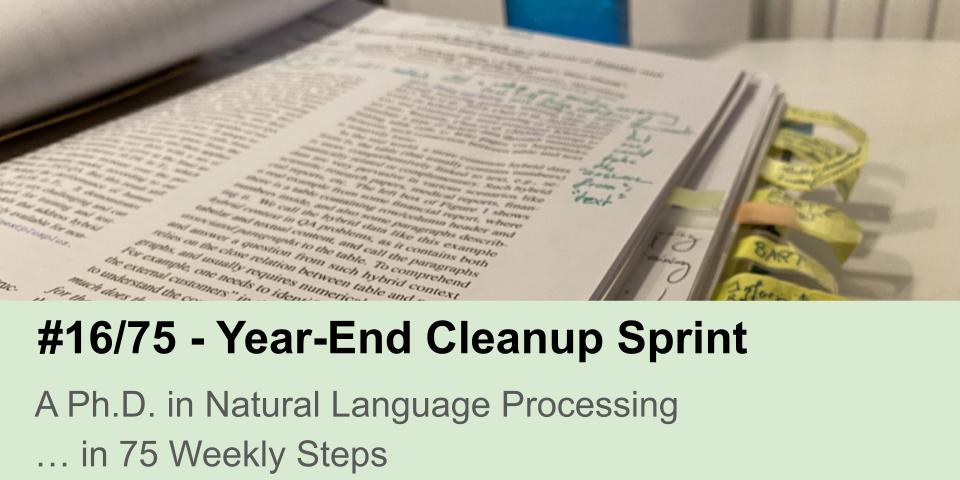2022-12-24: Update 16/75 - Year-End Cleanup Sprint
Literature management was not a topic that I considered worth revisiting. Then, my supervisor proposed standardizing our literature management approach at the chair this week, so I had to switch.
In this post, I will thus share my experience with switching from a spreadsheet-based system to Zotero, including how many hours I spent on this task.
Oh, and Happy Christmas!
You can follow these updates: Substack Blog Telegram WhatsApp LinkedIn Medium Twitter Calendly
 Managing all this, and much more, in software is quite easy.
Managing all this, and much more, in software is quite easy.
What Happened Since Last Week?
I looked up databases with equity research reports. There was also a helpful hint from one of the readers. Thank you.
I will stick with one of the many databases that the University of St. Gallen provides.
Regarding Zotero and reference management in general: I have previously used a spreadsheet with the following columns:
- Name of paper
- Author
- Year
- Published in
- Quality category
- Domain category
- Link to PDF
- Original source of full text
- Bibtex
- Notes
As you can see, the spreadsheet contained a column with a Bibtex entry. I could simply copy-paste this entry into my paper to use an article in my own writing.
The system was working very well, especially because I kept all data in the spreadsheet as clean as possible.
But now, with Zotero, there are some additional advantages:
- Zotero allows users to tag papers with custom keywords.
- Zotero allows users to connect papers. This creates a paper knowledge graph.
- Zotero allows for shared folders. We have a shared folder at our research chair.
You may know that I am a big fan of the Second Brain/Zettelkasten method of organizing notes. Zotero comes much closer to this interconnected note-taking style than my previous spreadsheet-based approach. In short, the ability to add well-structured notes and to organize literature multi-dimensional is an advantage over the one-dimensional spreadsheet approach.
A word on multi-dimensional vs. one-dimensional structure: Why would a spreadsheet only be one-dimensional? A single spreadsheet can only have as many dimensions as you add columns. But adding columns to a spreadsheet often comes at the expense of convenience for data entry and data retrieval. In other words: Highly-dimensional data gets messy in simple spreadsheets.
With label-enabled systems such as Zotero, however, one can add labels to a piece of literature. Such systems are multi-dimensional by default. Filtering labels is easy. The view of the reader is not cluttered with many tables. Adding labels as they emerge does not come with the downside of having to re-work old entries to the literature database.
What was the cost of the switch? It took me about five hours to transfer about 70% of my literature database to Zotero. My literature database has 300 entries, and I left out some entries that I found to be no longer useful. So you can expect one or two full days of work for a database with a couple of hundred entries.
What Were the Biggest Obstacles?
No obstacles. Things were quiet around the Christmas season, and there was not much to get distracted with.
Which Goals Did I Meet?
- Fix the tokenizer bug in the code. (Credit goes to my co-author.)
- Get familiar with Zotero.
- Switch literature management to Zotero.
Which Goals Did I Miss?
- Get equity research reports for the B.Sc. student.
- Make diagrams based on the preliminary experiments.
Was It a Good Week?
Yes, all good! I recovered from a flu-like infection and got a lot of work done.
Short-Term Tasks for The Coming Week
- Get equity research reports for the B.Sc. student.
- Make diagrams based on the preliminary experiments.
About “75-Step Journey Toward a Ph.D. in Natural Language Processing”
You will, from now on, witness my grind. Feel my blood, sweat, and tears.
With this series of articles, you become a real-life weekly witness of my dissertation progress, all in 75 steps. This has multiple purposes:
1) Forcing myself to keep moving through the power of public shame!
2) Helping other (prospective) Ph.D. students to stay motivated and to show that hard times are normal when going through this process.
3) Getting support from the community when I go through hard times.
Share this with your Ph.D. student friends: Substack Blog Telegram WhatsApp LinkedIn Medium Twitter Calendly.
Read More From the 75 Steps Toward a Ph.D. in NLP Series
2022-08-20: Update 1/75 - Kicking Off the Journey Toward a Ph.D. in NLP
2022-08-28: Update 2/75 - Literature Review
2022-09-04: Update 3/75 - Back on Track and Back to Vallendar
2022-09-10: Update 4/75 - Long Test Runtime; Retriever Works
2022-09-18: Update 5/75 - Jour Fixe Joy
2022-09-26: Update 6/75 - Reading Group
2022-10-02: Update 7/75 - Leaving the Phone at Home
2022-10-09: Update 8/75 - Finding a Conference
2022-10-16: Update 9/75 - Dataset - Make or Take
2022-10-23: Update 10/75 - Still Unsure About the Dataset
2022-10-30: Update 11/75 - NVIDIA DGX-2 and Swiss Cheese
2022-11-10: Update 12/75 - Three Days of Conference via Zoom
2022-11-24: Update 13/75 - Vacation and Roadmap for 2023
2022-11-30: Update 14/75 - Supervising B.Sc. and M.Sc. Theses
2022-12-14: Update 15/75 - A Rather Uneventful Week
2023-01-01: Update 17/75 - New Year’s Resolutions
2023-07-20: Update 18-28/75 - A Long Gap and Two Papers Handed In!
2023-12-12: Update 29-50/75 - First On-Site Conference Visit and Increased Focus